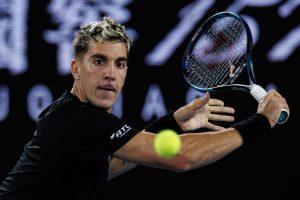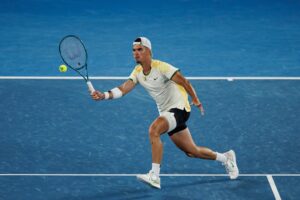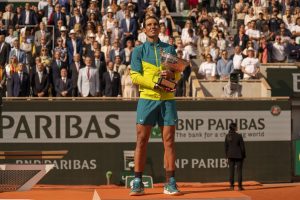There comes a time for players to get serious, up their game ,and have fun in feeling the results of winning. The Serbian is beginning to do this now.
Novak Djokovic came upon the World #1 ranking recently because Rafael Nadal had lost his grip on gaining ranking points by injuries and ailments stopping him from playing. When he had withdrew from the Nitto ATP Finals, this gave Djokovic the position of sliding into that #1 spot happily. But over the years, before the injuries that kept him out of the game, Djokovic was always called “The Joker,” for his funny personality and perspective on having great stability at playing unstoppable tournaments. After injuries and his “comeback,” that nickname somehow faded. It was his crawl back up the rankings that he became more serious to get back on court, have pleasure instead of pain from playing and become successful again. He’s accomplished that big time and now is very serious about stabilizing his game and keeping his performance number one.
Five reasons why Novak Djokovic is more serious about his game:
1. His age
For one, his age. He’s no longer a 20-year-old, experimenting with his game, taking for granted his capacity of coming back and winning matches and titles with the next tournament. At 31, he knows this is serious times and for him to become a serious player and contender is necessary to stay visible in the game.
2. Injuries
The second reason for the Serbian not joking as before is the injuries. It was last year in 2017 he held a press conference in Belgrade, Serbia saying that he’d skip all tournaments until January of this year. This was because of his elbow injury and then undergoing surgery. He admitted to suffering a year and a half with the elbow, but things grew worse around May and June of 2017, especially at Wimbledon. He retired from the Tomas Berdych quarterfinal match and the situation was quite concerning. “This injury started in Autumn, 2015, since then I played all tournaments under medications…I need to rest without my tennis racket and spend two months without playing…the rest is necessary…this is a serious injury and I took it seriously”, he emphasized.
3. The competition
Djokovic isn’t acting as comical as years ago perhaps because of the competition factor. A while back Djokovic’s opponents were the top 5, 10 and even 20 ranked in the world, now added to the pack is the NextGen players who are younger, more spirited and totally a threat. They have defeated other NextGens as well as players in the top 20s and even veterans on the circuit. Djokovic has beaten Alexander Zverev, a top NextGen as well as Marin Cilic and John Isner at the Nitto ATP Finals, and also defeating Roger Federer and Kei Nishikori.
4. Consistency
The fourth reason why the Serbian isn’t joking a lot anymore is that he has to focus on consistency and performance. Winning one tournament is great but if Djokovic can be consistent and get into the semifinal or final of many tournaments, even win a few titles, he can say he’s back. This is slowly evolving now. He was testing his court play at the beginning of the season, with the Australian Open, losing to Hyeon Chung, and later to Taro Daniel at Indian Wells. But the Serbian dropped some steady blasts on Dominic Thiem at the Monte Carlo Masters. Unfortunately, though, the Grand Slams had him fizzling. He talked briefly about it after Wimbledon saying “I had many moments of doubt, didn’t know really if I could come back to a level to compete…” By the time the Cincinnati Masters had came, Djokovic had his feet firmly planted on winning grounds and other than losing a final to Karen Khachanov at the Paris Masters and getting blitz by Alexander Zverev at Nitto, he could feel just a bit confident that he has arrived again with the four titles he earned this year as Wimbledon, Cincinnati, US Open and Shanghai Masters.
5. Schedule
The fifth and last issue of Djokovic’s trying to maintain a better year to come will be adjusting his schedule to benefit his stamina and ability to perform at his best. With his recuperation he says “I had to trust the process and trust in myself.” He still may have to curtail many tournaments throughout the year, pacing himself and tracking his wins and losses, not to burn himself out, prevent getting re-injured and have fun at gaining success and titles again.






